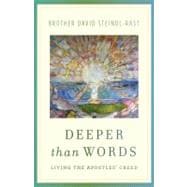
What is included with this book?
| Foreword | p. 9 |
| Introduction | p. 13 |
| I Believe | p. 19 |
| I Believe in God | p. 24 |
| The Father | p. 31 |
| The Father Almighty | p. 37 |
| Creator of Heaven and Earth | p. 41 |
| And in Jesus Christ | p. 46 |
| God's Only Son | p. 53 |
| Our Lord | p. 59 |
| Conceived by the Holy Spirit | p. 65 |
| Born of the Virgin Mary | p. 71 |
| Suffered Under Pontius Pilate | p. 78 |
| Crucified | p. 85 |
| Died and Was Buried | p. 96 |
| He Descended into Hell | p. 100 |
| The Third Day He Rose Again from the Dead | p. 104 |
| He Ascended into Heaven | p. 114 |
| He Sits at the Right Hand of God the Father Almighty | p. 121 |
| Thence He Shall Come to Judge the Living and the Dead | p. 127 |
| I Believe in the Holy Spirit | p. 133 |
| The Holy Catholic Church | p. 138 |
| The Communion of Saints | p. 144 |
| The Forgiveness of Sins | p. 149 |
| The Resurrection of the Body | p. 155 |
| And Life Everlasting | p. 163 |
| Amen | p. 167 |
| Table of Contents provided by Ingram. All Rights Reserved. |
The New copy of this book will include any supplemental materials advertised. Please check the title of the book to determine if it should include any access cards, study guides, lab manuals, CDs, etc.
The Used, Rental and eBook copies of this book are not guaranteed to include any supplemental materials. Typically, only the book itself is included. This is true even if the title states it includes any access cards, study guides, lab manuals, CDs, etc.